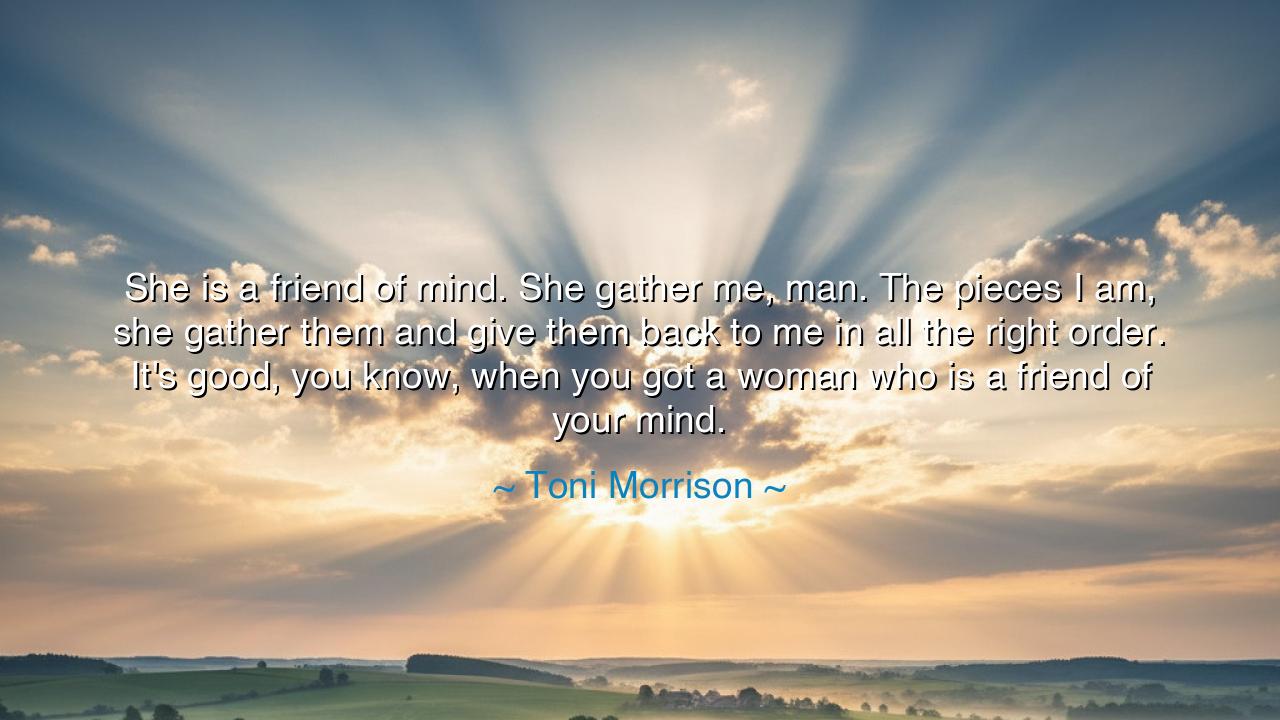
She is a friend of mind. She gather me, man. The pieces I am, she
She is a friend of mind. She gather me, man. The pieces I am, she gather them and give them back to me in all the right order. It's good, you know, when you got a woman who is a friend of your mind.






“She is a friend of mind. She gather me, man. The pieces I am, she gather them and give them back to me in all the right order. It’s good, you know, when you got a woman who is a friend of your mind.”
Thus spoke Toni Morrison, the high priestess of American letters, whose words pulse with the rhythm of truth and the tenderness of the human soul. In this exquisite passage, Morrison speaks not merely of affection, but of soulful friendship, of a bond that transcends flesh and enters the realm of spirit and intellect. She celebrates the woman who is not only a companion of the heart, but a friend of the mind—one who sees deeply, who heals by understanding, who gathers the scattered fragments of a man’s being and restores him to wholeness. This is not the friendship of ease, but of revelation; not the love of passion, but the love of recognition.
The origin of these words flows from Morrison’s 1977 novel Song of Solomon, a tale steeped in myth, ancestry, and the search for self. Morrison, as both storyteller and seer, understood that the human condition is one of fragmentation. Life scatters us—through struggle, failure, grief, and misunderstanding. And yet, she teaches, there are those rare souls who can gather what the world has broken. The friend of mind is such a soul. She does not merely comfort; she comprehends. Her love is not a flame that burns, but a light that arranges, bringing order to chaos, meaning to confusion, peace to a heart undone.
The meaning of Morrison’s quote reaches into the deepest chambers of intimacy. To call someone “a friend of mind” is to speak of a union where thought, spirit, and affection intertwine. Such a person does not possess or demand; she perceives. She listens not only to words, but to silence; she knows the unspoken longing, the quiet despair. When Morrison says, “She gather me,” she invokes an ancient truth—that we are not whole by ourselves. We are made and remade through those who see us clearly. And when she adds, “She give them back to me in all the right order,” she reveals the power of understanding—that sacred act by which one soul restores another to its truest form.
This idea finds its echo across the ages. Consider the friendship between Socrates and Plato—a meeting of minds so profound that their dialogues became the foundation of Western philosophy. Plato, through the questions and wisdom of his teacher, found the pieces of his own intellect gathered and refined, transformed into a new order of thought that endures to this day. So too, in the quiet intimacy Morrison describes, the friend of mind is both healer and midwife—she helps another give birth to the better self hidden within. Her gift is not material but spiritual: she reminds him who he is, when the world has made him forget.
In Morrison’s words, we also hear the echo of gratitude—the humble recognition that such a friendship is rare and sacred. “It’s good, you know,” she says, with the simplicity of truth. For in a world that often values beauty over depth, passion over peace, and possession over partnership, to find someone who loves the mind—its wounds, its wanderings, its wildness—is to find a kind of salvation. The friend of mind does not flatter; she fortifies. She gathers not to control, but to restore. She gives back the self in balance, in harmony, in “all the right order.”
Let us not mistake Morrison’s words as belonging only to romance. They speak to the highest form of friendship—the meeting of two souls who lift one another toward wisdom. Such friendship exists beyond gender or desire; it is the union of understanding. To have one who knows your thoughts before you speak, who calls forth your best self from beneath your weariness, is to have found a sanctuary in human form. These are the friendships that heal not the body, but the mind—the sacred place where one’s identity, memory, and meaning reside.
Let this, then, be the lesson to all who seek connection in this world: look not only for beauty of face or harmony of interest, but for kinship of mind. Seek those who see your essence and reflect it back to you in truth. Be also a friend of mind to others—learn to listen without judgment, to perceive without pride, to gather the broken and return them whole. In every life, there will come a time when one is scattered. Blessed, then, is the person who finds another who can gather them again—who knows the map of their soul and helps them remember the way home.
Thus, the wisdom of Toni Morrison endures like a sacred hymn: “She is a friend of mind. She gather me, man.” For the greatest friendships are not those that consume us, but those that restore us. They are the quiet miracles that make us whole again—one gentle act of understanding at a time.






AAdministratorAdministrator
Welcome, honored guests. Please leave a comment, we will respond soon